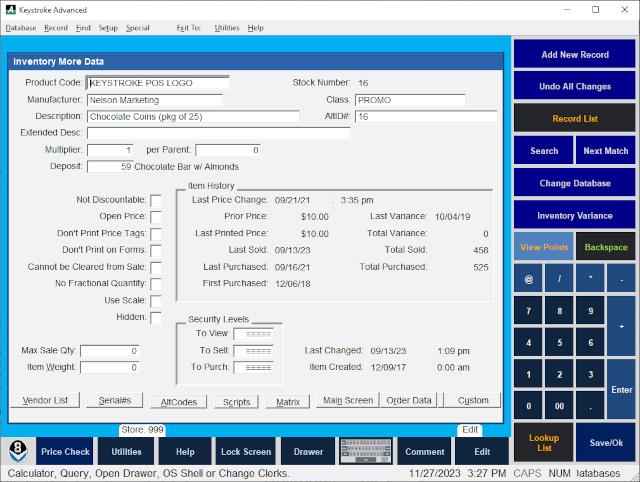

Fields displayed on the Inventory - More Data Screen:
Product Code - The item bar code characters, part, or product number (SKU, UPC, etc).
Manufacturer - Manufacturer Name or Manufacturer Number.
Description - Text description of the item (or service).
Extended Desc - Continuation of Description or alternate item description.
Stock Number - Used internally to identify each record and cannot be changed.
Class - Usage similar to Product Code.
AltID# - Usage similar to Product Code, but accepts only numbers.
Multiplier - For use with Bulk Purchases, Parent/Child Break-downs, and Matrix.
Parent - Defines a Child item's Parent item from which Quantity On Hand is replenished.
Deposit - Defines the item to be automatically added to the sales transaction with the current item.
Not Discountable - Prevents Clerks (with insufficient security) from changing the item's price on Sales Transactions.
Open Price - Allows anyone in the Sales Manager to edit the line item Price .
Don't Print Price Tags - Used to identify the item as one for which Price Tags are not normally printed.
Don't Print On Forms - Used to identify the item as one that should not be printed on invoices, orders, or receipts.
Cannot Be Cleared From Sale - Prevents the item from being removed from Sales Transactions.
No Fractional Quantity - Prevents the item from being sold in fractional quantities (i.e. 1.25).
Use Scale - Used to identify the item as one for which the quantity entered on Sales Transactions is to be read from an electronic scale.
Hidden - Used to define an item's database record as Hidden (Also see the Hide/Show and Search & Hide/Delete functions).
Last Price Change - The date the item's price was last changed.
Prior Price - The item's price before it was last changed.
Last Printed Price - The item's price at the time a price tag was last printed for it.
Last Sold - The date the item was last sold.
Last Purchased - The date the item was last ordered.
First Purchased - The date the item was first ordered.
Last Variance - The date the item was last counted on a Variance.
Total Variance - The item's running total of the quantity changed on Variances.
Total Sold - The total quantity sold on Sales Invoices.
Total Purchased - The total quantity received on Purchase Invoices.
Max Sale Qty - Used to define the maximum quantity of the item that can be sold on a single sales transaction.
Item Weight - Used to define either the item's per-unit weight or its tare weight.
Security Levels - Defines the Security Levels required for Clerks to view, to sell, and to purchase the item.
Last Changed - The date the item's Inventory database record was last changed.
Item Created - The date the item's Inventory database record was created.
Inventory Screen Buttons
Vendor List - Press [Alt]+[v] to display/edit item Vendor Information.
Serial #s - Press [Alt]+[s] to display/edit item Serial Numbers.
AltCodes - Press [Alt]+[a] to display/edit item Alternate Codes.
Scripts - Press [Alt]+[c] to display the Scripted Item Screen.
Matrix - Press [Alt]+[m] to display the item Matrix Table.
Main Screen - Press [Alt]+[r] to display the Order Data Screen.
Order Data - Press [Alt]+[d] to display the More Data Screen.
Custom Data - Press [Alt]+[u] to display the Custom Data Screen.